Thanks for your support! If you make a purchase using our links in this article, we may make a commission. And, as an Amazon Associate, I earn from qualifying purchases. See the full disclosure here.
Updated May 6, 2024
Gooseneck vs. 5th wheel hitches: what exactly is the difference? And which should you use for your RV? We explain everything you need to know here.
On the surface, gooseneck and 5th wheel hitches can seem pretty similar. Both are installed in the bed of a pickup truck and used to haul some kind of trailer. But in fact, gooseneck and 5th wheel hitches have some major differences.
Let’s take a closer look at the differences between gooseneck vs. 5th wheel hitches and the pros and cons of each. Then, we’ll help you decide which hitch is right for you.
- Do RVs Have Gooseneck Hitches?
- Gooseneck vs. 5th Wheel Hitches Differences Explained
- Fifth Wheel Hitch Features and Details
- 3 Main Pros of 5th Wheel Hitches
- 3 Cons of 5th Wheel Hitches
- Gooseneck Hitch Features and Details
- 4 Main Pros of Gooseneck Hitches
- 3 Cons of Gooseneck Hitches
- How To Choose Between a Gooseneck vs. 5th Wheel Hitch
- Can A Bumper Pull Hitch Be Converted To a Gooseneck?
- Final Thoughts on Gooseneck vs. 5th Wheel Hitches
- Related Reading:
- About the Author
Do RVs Have Gooseneck Hitches?
RVs come in two styles bumper pull and 5th-wheel. Gooseneck hitches are more commonly seen on construction-style trailers as well as horse trailers.
In the RV world, the 5th wheel is the gooseneck trailer. More maneuverability and higher weight ratings make it a popular choice. Gooseneck hitches provide both of these things in a very simple easy-to-use hitch but they are not seen on RVs.
Gooseneck vs. 5th Wheel Hitches Differences Explained
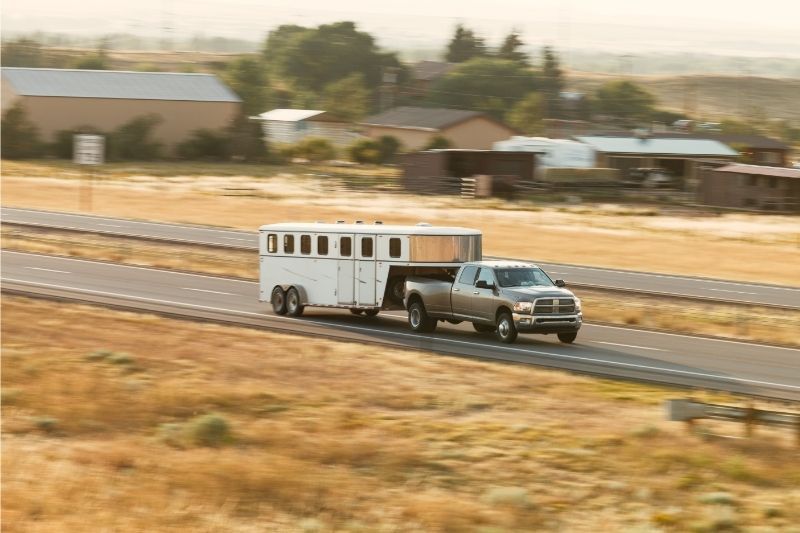
The main difference between gooseneck vs. 5th wheel hitches is how they’re installed and what they’re used for.
A gooseneck hitch is bolted to the underside of the truck bed. The hitch ball sits above the cargo bed’s floor like in the picture below.
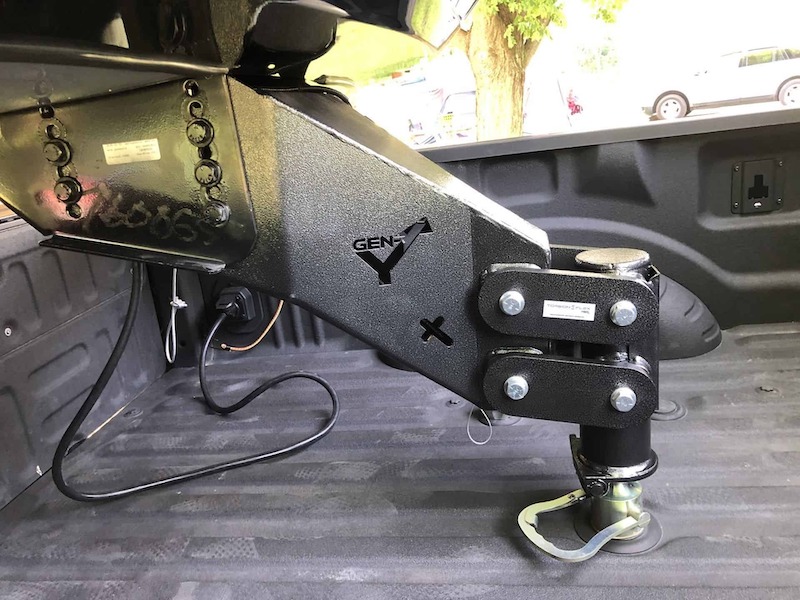
Fifth wheel hitches require you to first install rails into the truck’s bed. Then, the hitch attaches to these rails. The fifth wheel apparatus is bulky and takes up a fair amount of space in the cargo bed but can be removed if needed.
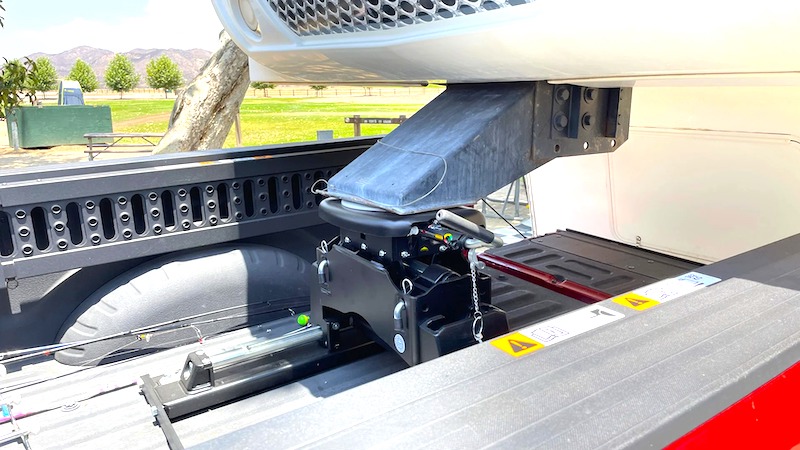
Another difference is how the hitches attach to your trailer. Like a travel trailer standard ball hitch, a gooseneck trailer uses a long coupler that goes over the ball.
On the other hand, fifth-wheel trailers use what’s known as a pin box and a kingpin. The kingpin is inserted into the 5th wheel head, which clamps down on the kingpin. This is basically the same as how semi-truck hitches work.
The final significant difference is the purpose of each hitch. Gooseneck hitches are typically used for commercial and agricultural applications, such as livestock and flatbed trailers. Meanwhile, fifth-wheel hitches generally are used for cargo and recreational towing – that is, for towing RVs.
Big Truck Big RV does a great job of showing the differences between a gooseneck vs. a fifth wheel hitches.
Fifth Wheel Hitch Features and Details
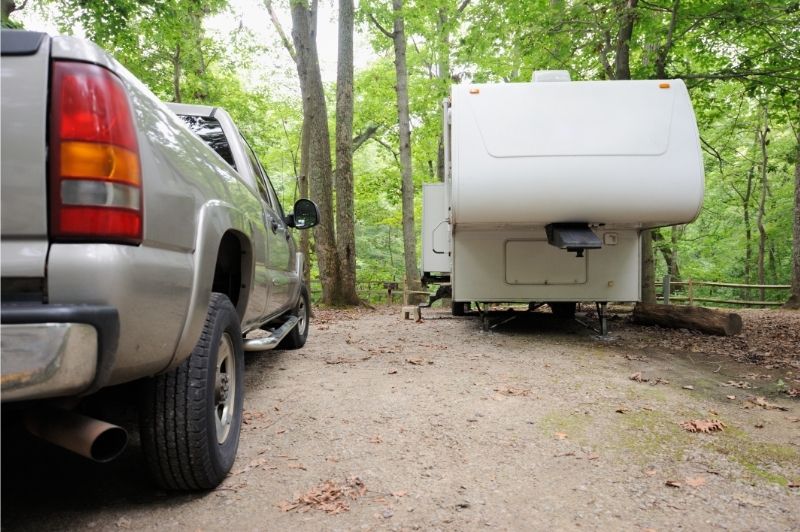
Let’s look at the pros and cons of using 5th-wheel hitches.
3 Main Pros of 5th Wheel Hitches
Comparing gooseneck vs. fifth wheel hitches, fifth wheels have many key advantages.
1. Accessibility
5th wheel hitches (at least for RVers) are that 5th wheel couplers are way more common than gooseneck couplers on towed RVs. You generally won’t find gooseneck couplers on recreational trailers of any kind.
2. Noise
5th wheel hitches are much quieter. You won’t have to worry about extra noise in your cab while hauling your fifth-wheel RV. Hitch companies are constantly developing noise reduction technology and chucking minimizing enhancements.
3. Stability
Especially with taller trailers, 5th-wheel hitches provide a much more stable ride. That also means less wear and tear on your RV.
4. Simplicity
5th wheel hitches are also simpler to install than gooseneck hitches. While installing a gooseneck hitch requires the nerve-wracking step of cutting a hole in your truck bed, a 5th wheel just requires you to bolt a pair of rails into the bottom of your cargo box.
3 Cons of 5th Wheel Hitches
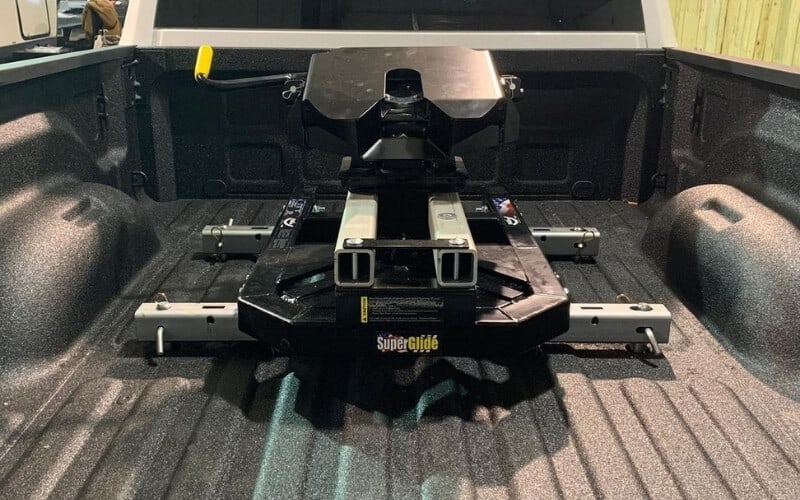
Of course, 5th wheel hitches do have some downsides versus gooseneck hitches.
1. Cost
The biggest downside is cost. Due to being larger and more complex, a 5th wheel hitch can be five times the cost of a gooseneck hitch. The average fifth-wheel hitch and installation cost can be in the early four figures. So if you want to install a 5th wheel hitch, it can be a significant hit to your wallet.
2. Size
The second major downside is size. While a gooseneck takes up almost no space in your truck bed, a 5th wheel hitch will take up a lot more room, taking up a quarter or more of your available truck bed space. Since it sits in the center above your back axle and slides around, it’s not recommended to store anything in the cargo bed while towing.
3. Weight
5th wheel hitches are heavy. Smaller versions are less, but realistically, expect a fifth-wheel hitch to add 100-300 pounds to your truck. Many of these hitches disassemble into 2-3 parts, breaking the weight into more manageable sections.
So while you can remove them, you’ll likely need help to do so. Unless you need your cargo box regularly, many leave the hitch in the cargo box with a weather cover and use the space around it.
Gooseneck Hitch Features and Details
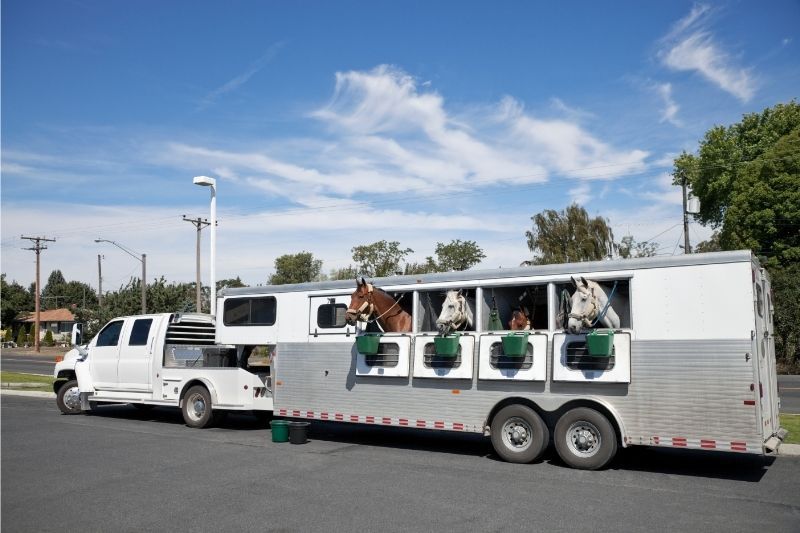
Let’s look at the benefits and downsides of gooseneck hitches.
4 Main Pros of Gooseneck Hitches
When it comes to gooseneck versus 5th wheel hitches, gooseneck hitches have many key advantages.
1. Space
While a bulky 5th wheel hitch takes up a ton of space in the bed of your truck, a gooseneck hitch takes barely any. There’s just a small hitch ball in your truck bed. If you frequently use your pickup to haul cargo of any kind, this makes a gooseneck hitch way more convenient.
You won’t have to move a big heavy apparatus every time you want to use your truck bed.
2. Cost
Gooseneck hitches are also significantly cheaper than 5th-wheel hitches. You can save hundreds of dollars by buying and installing a gooseneck hitch. Some auto manufacturers even have an option to pre-install some of the needed components.
3. Towing Diversity
If you’ll regularly be towing more than just an RV, a gooseneck hitch is a great option. If you haul things like flatbeds or livestock trailers, you’ll typically need a gooseneck hitch.
Some hitch manufacturers make convertible hitches that let you tow fifth wheels with your gooseneck hitch. These hitches don’t have the weight capacity like true fifth wheel receivers, but your RV dealer will show you some comfortable fivers you may enjoy.
4. Hitch Equipment Weight
On the topic of weight, this is another advantage of gooseneck hitches. They’re much lighter than 5th wheel hitches, so they won’t add much weight. In addition to taking up less space, the lower weight makes gooseneck hitches a good choice for those who need to use their truck bed to carry things.
3 Cons of Gooseneck Hitches
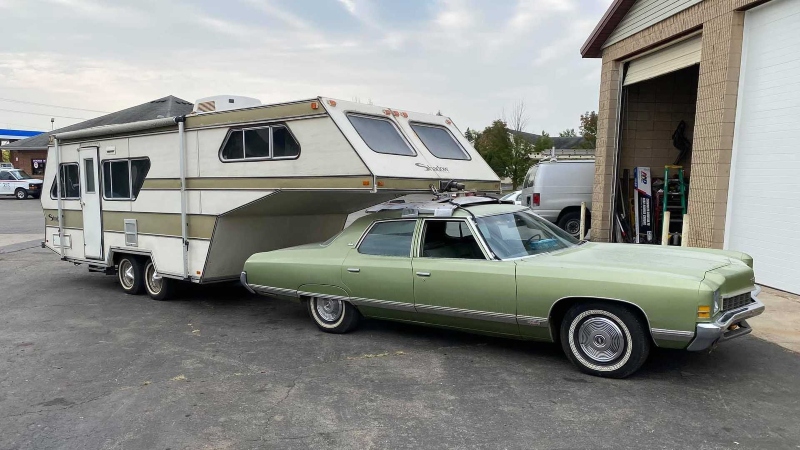
Gooseneck hitches have some downsides versus 5th wheel hitches, especially for RVers.
1. Noise
First, gooseneck hitches are louder and less stable than 5th-wheel hitches. A trailer attached to a gooseneck hitch will experience more movement on the road – and you’re going to hear it. This is especially true for tall fifth wheel trailers.
2. Hitch Installation
Installing a gooseneck hitch is more difficult than installing a 5th wheel hitch. You’ll need to cut a hole for the hitch ball and get under the truck to do the installation. Because of this, it’s often recommended to have a professional install your gooseneck hitch for you.
3. RV Incompatibility
Finally, the biggest downside for gooseneck hitches, at least for RVers, is that towable RVs aren’t typically designed for them. If you have a towable RV intended to be pulled from a truck bed, it’s almost guaranteed to have a fifth-wheel coupler. The only RVs made to be towed by gooseneck were a few back in the 1970s that never sold well.
How To Choose Between a Gooseneck vs. 5th Wheel Hitch
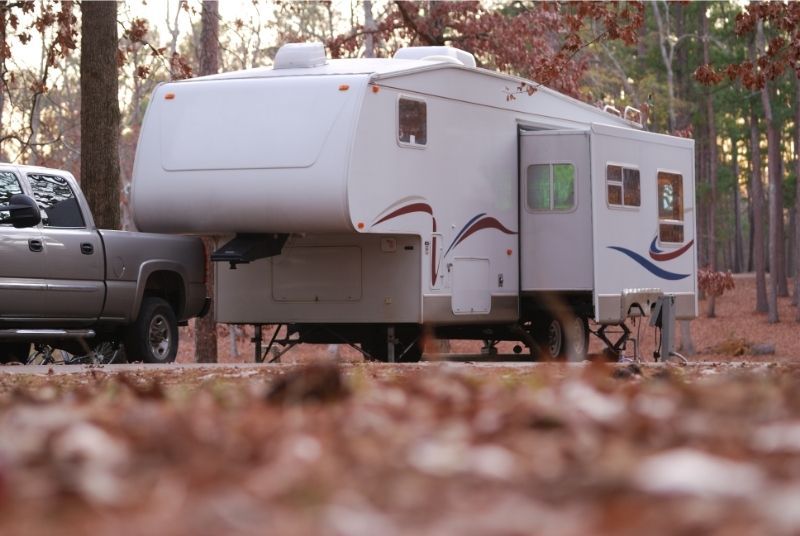
When choosing between a gooseneck vs. a 5th wheel hitch, your RV’s main deciding factor.
The best (and simplest) option is to choose the kind of hitch your RV needs. And in pretty much every case, that means a 5th wheel hitch.
Of course, some adapters can convert a gooseneck hitch to a 5th wheel hitch. However, using an adapter will reduce your weight limit, so you must keep that in mind.
Yet, if you find that perfect fifth-wheel RV within the convertible hitch’s weight tolerance, you can enjoy the best of both worlds. Be sure the adaptive hitch won’t void your RV’s warranty.
The biggest reason is if you haul trailers besides your RV. If you regularly pull a gooseneck trailer, you’d better stick with a gooseneck hitch. Then, when it comes time to tow your RV, you can attach a fifth-wheel adapter. But be sure to keep an eye on your weight limits.
Can A Bumper Pull Hitch Be Converted To a Gooseneck?
Gooseneck hitches are connected to the trailer in the same location as a standard bumper pull. The difference is the gooseneck extends up and over the truck bed to connect over the axle.
Looking at a bumper pull you may think it would be pretty easy to turn a bumper pull into a gooseneck. Well, it’s not what I’d consider “easy” however, it can be done.
There are kits that actually convert bumper pull hitches to a gooseneck. The conversion isn’t very common as it is expensive and requires skilled work to complete safely. We take a in-depth look at bumper pull to gooseneck conversions on our sister site.
Final Thoughts on Gooseneck vs. 5th Wheel Hitches
Gooseneck and 5th wheel hitches have some commonalities, but they’re ultimately used for different applications.
When it comes to gooseneck vs. 5th wheel hitches, the 5th wheel hitch will be the better choice for an RVer. Besides the fact RVs are usually designed for a 5th wheel rather than a gooseneck hitch, a 5th wheel hitch also provides smoother, more stable towing for your RV.
Gooseneck hitches are typically used for agricultural and commercial towing. It’s less stable, noisier, and requires you to cut a hole in your truck bed. But if you pull more than just your RV, you may benefit from installing a gooseneck hitch.
Even if your RV is designed for a different hitch, gooseneck hitches can be changed to 5th-wheel hitches using an adapter. So if you need lots of versatility in your towing setup, this is an option to consider.
The bottom line on gooseneck vs. 5th wheel hitches? If an RV is what you’re towing, the 5th wheel hitch is your best choice.
Related Reading:
–10 Best-Built Fifth Wheels You Need to Know About
–7 Best 5th Wheels with a Bath and a Half
–10 Best Half-Ton 5th Wheels
–How Tall Is a 5th Wheel Camper?
About the Author
Jennifer and Kendall are avid RVers and part-time van lifers who share their years of experience both as full-time RVers and nomads through writing.
Jenn and Kendall have explored Canada, the USA, and Mexico while RVing and living full-time in all 3 countries.
They have been fortunate to work not only as part of the RVBlogger team but also with RVLife, DIY RV, Camper Report, RV Magazine, Rootless Living, Vanlifers, and more.
They have also shared their RV experience through DashboardDrifters.com and are the founders of RVSpotDrop, a web service for full-time RVers.



I’ve owned and towed both. The “gooseneck” or other bed mounted ball hitch setup, is VASTLY nicer to deal with than the clunky pin type. I don’t know where you got the idea that a gooseneck is “noisy” – that’s one of my complaints about the pin style – the whole affair clanks, clunks, thumps and thuds, and transmits motion from the trailer to the truck that you don’t feel with a ball setup. The only downside to the ball/gooseneck hitch is you MUST have sufficient clearance between the sides of the truck and the bottom of the trailer overhang. A stepside truck worked much better for this back in the day, or a chassis cab/flatbed would be ideal now.